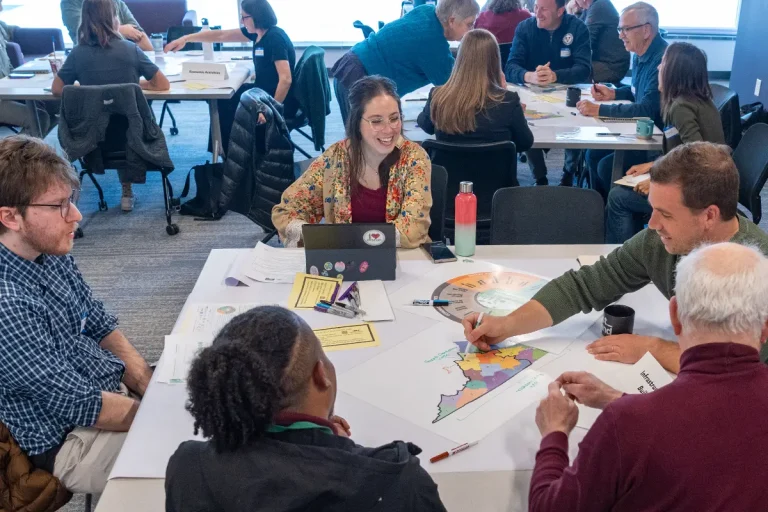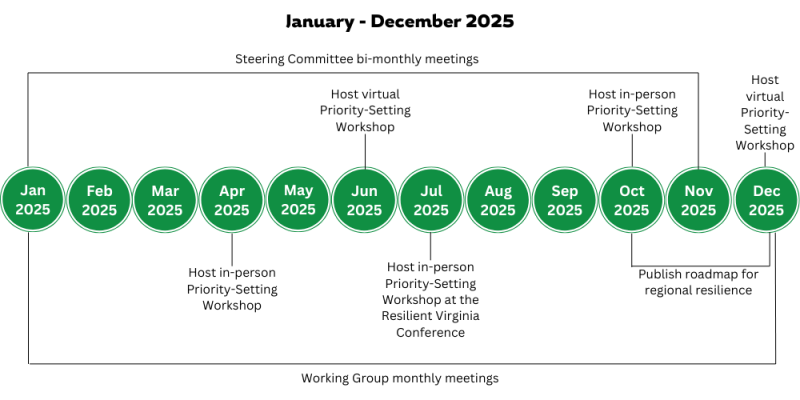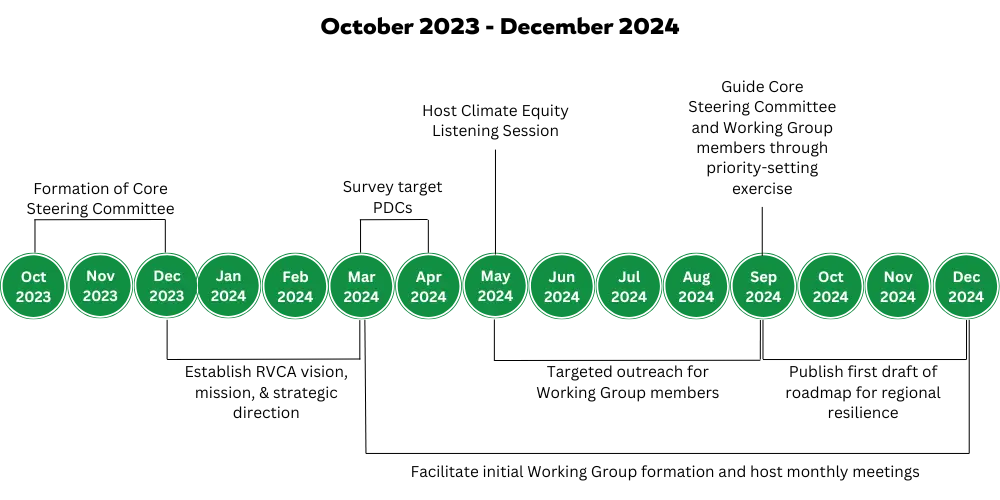Accelerating resiliency planning in communities across the Commonwealth
Resilient Virginia Collaborative Alliance
Creating Climate-Ready Communities in Central and Southwest Virginia
The Resilient Virginia Collaborative Alliance was established in 2023 to build regional capacity to:
- address equity, economic, social, and climate challenges;
- create a roadmap for regional climate resilience; and
- integrate climate mitigation and adaptation strategies to address challenges and take advantage of opportunities.
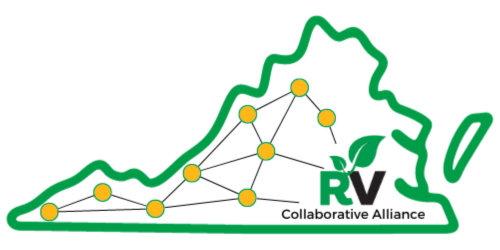
Our 2025 Priority-Setting Workshops Are Scheduled.
Register Now for FREE In-Person or Virtual Workshops!
Why Start a Collaborative?
Resilience Challenge
To date, extensive resiliency planning and projects have been limited to the coastal region of the Commonwealth, while the central and southwest regions remain typically under-resourced. This leaves them more vulnerable to increasing threats from extreme weather events and unpredictable climate patterns. These climate impacts exacerbate existing economic, environmental, health, equity and other community challenges.
It is critical to identify, address, and prepare for these risks and challenges so that communities can continue to be vibrant and secure places to live and work.
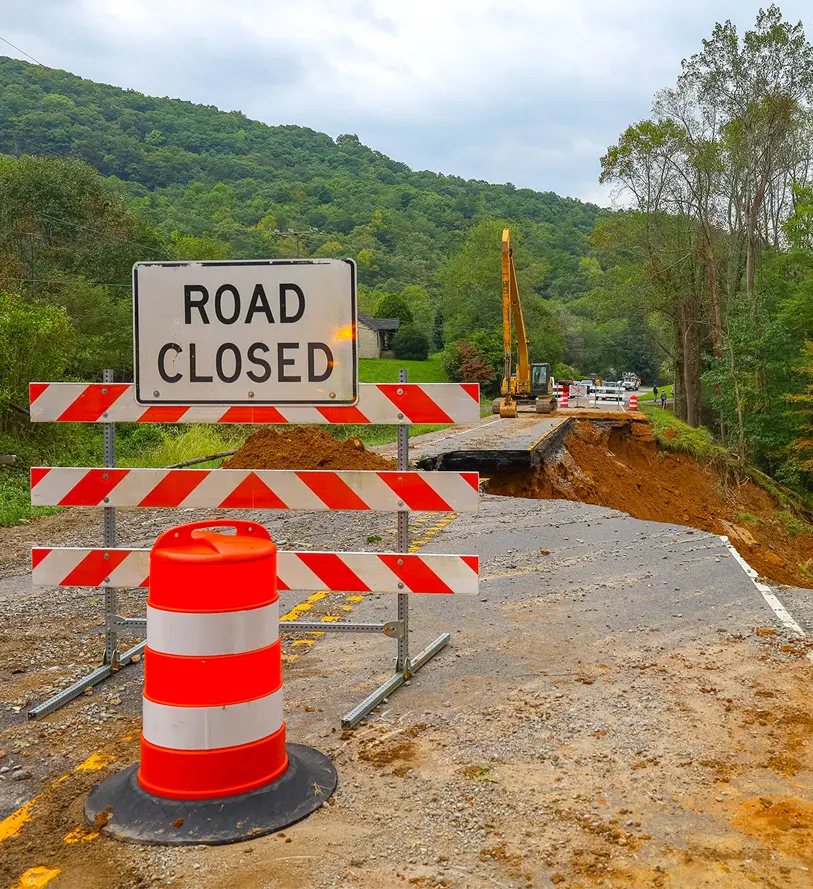
April 8, 2025 RVCA Priority-Setting Meeting, Harrisonburg, VA. Photo: JMU/Rachel Holderman.
Resilience Solution
The Resilient Virginia Collaborative Alliance is building capacity to address equity, economic, social, and climate challenges in under-resourced communities in the central and southwest parts of the state. By convening regional stakeholders, we are gaining a better understanding of their top priorities and concerns while offering a platform for peer-exchange, training opportunities, and building partnerships.
This aggregation of regional voices amplifies their priorities and concerns to state leaders, giving them a better chance of receiving the resources they need to build climate-ready communities.
Collaborative Structure
In order to centralize outreach and action, collaborations need a foundational backbone. Since 2014, Resilient Virginia has been a nonpartisan organization facilitating relationships between government, nonprofit, business, community, academia, and private sector entities to accelerate resiliency planning. As such, we are distinctly positioned to be the backbone organization on which the RVCA functions.
We are uniting these sectors to define priorities, share resources and tools, and streamline the process of resiliency planning and project funding in Central and Southwest Virginia.
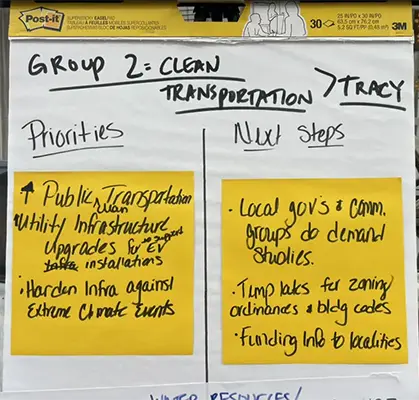
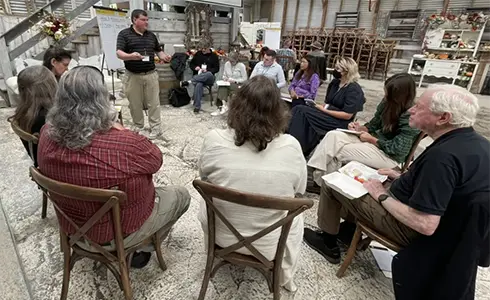
Steering Committee
Established in Fall 2023, the Steering Committee has worked with Resilient Virginia to establish the collaborative’s mission, identify the most beneficial direction for the collaborative, and delineate action plans through the development of working groups.
The committee remains active and meets bi-monthly to discuss the formation of additional working groups, identify additional stakeholders, and ensure the collaborative’s programs add value to the resilience and climate-readiness of Virginia.
Moving Forward 2025–2026
Depending on the expressed needs and requests in the region, funding availability, and staffing capacity, Resilient Virginia foresees various roles and responsibilities the organization could fulfill as the backbone organization of the RVCA. Examples include:
- Develop and host instructional sessions.
- Partner with others to develop a database of on-going resilience-related projects and efforts in the region.
- Bring universities together for discussion on synergy in projects.
- Build a toolbox of vetted and reliable resilience resources.
- Manage pass-through grant funding to localities in the region.
- Partner with localities, businesses, colleges and universities, and other nonprofit organizations on grant applications.
- Continue to bring together EJ organizations for peer exchange.
- Organize and manage additional priority-setting meetings for the region.
- Continual outreach to potential stakeholders for working groups and other RVCA efforts.
- Reach out to potential sponsors and apply for grants to fund the RVCA.
- Expand our initial PDC survey efforts to perform a needs assessment for the region.
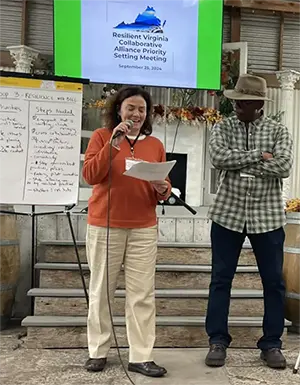
Funding Partners
As community leaders in our Commonwealth, Funding Partners are in a prime position to be effective change-makers through the Resilient Virginia Collaborative Alliance. The collaborative is a platform where multidisciplinary sectors come together to share ideas and discuss best practices, ultimately resulting in stronger communities. Supporting this work, a Funding Partner is recognized as a company or organization that champions these collaborative efforts.
Funding Partners provide essential support for long-term climate resilience throughout Central and Southwest Virginia.

